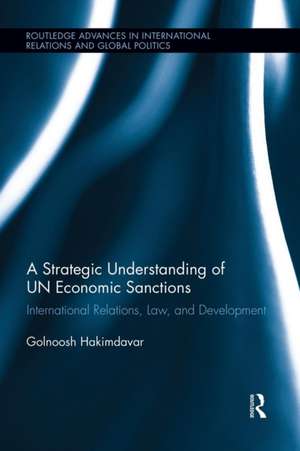A Strategic Understanding of UN Economic Sanctions: International Relations, Law and Development: Routledge Advances in International Relations and Global Politics
Autor Golnoosh Hakimdavaren Limba Engleză Paperback – 16 iul 2015
| Toate formatele și edițiile | Preț | Express |
|---|---|---|
| Paperback (1) | 384.31 lei 6-8 săpt. | |
| Taylor & Francis – 16 iul 2015 | 384.31 lei 6-8 săpt. | |
| Hardback (1) | 1113.60 lei 6-8 săpt. | |
| Taylor & Francis – 9 iul 2013 | 1113.60 lei 6-8 săpt. |
Din seria Routledge Advances in International Relations and Global Politics
-
 Preț: 383.48 lei
Preț: 383.48 lei -
 Preț: 310.55 lei
Preț: 310.55 lei -
 Preț: 188.83 lei
Preț: 188.83 lei -
 Preț: 152.86 lei
Preț: 152.86 lei -
 Preț: 311.59 lei
Preț: 311.59 lei - 9%
 Preț: 1003.12 lei
Preț: 1003.12 lei -
 Preț: 317.91 lei
Preț: 317.91 lei - 8%
 Preț: 390.08 lei
Preț: 390.08 lei -
 Preț: 377.82 lei
Preț: 377.82 lei -
 Preț: 303.47 lei
Preț: 303.47 lei - 18%
 Preț: 1170.74 lei
Preț: 1170.74 lei - 18%
 Preț: 1051.55 lei
Preț: 1051.55 lei - 18%
 Preț: 1220.46 lei
Preț: 1220.46 lei - 28%
 Preț: 850.99 lei
Preț: 850.99 lei - 18%
 Preț: 1056.32 lei
Preț: 1056.32 lei - 18%
 Preț: 1053.57 lei
Preț: 1053.57 lei - 18%
 Preț: 1057.89 lei
Preț: 1057.89 lei - 18%
 Preț: 1056.32 lei
Preț: 1056.32 lei - 18%
 Preț: 1066.09 lei
Preț: 1066.09 lei - 18%
 Preț: 1062.26 lei
Preț: 1062.26 lei - 18%
 Preț: 1056.32 lei
Preț: 1056.32 lei - 15%
 Preț: 449.41 lei
Preț: 449.41 lei - 25%
 Preț: 300.01 lei
Preț: 300.01 lei - 18%
 Preț: 1167.36 lei
Preț: 1167.36 lei - 28%
 Preț: 820.56 lei
Preț: 820.56 lei - 18%
 Preț: 1060.87 lei
Preț: 1060.87 lei - 18%
 Preț: 1270.98 lei
Preț: 1270.98 lei - 18%
 Preț: 1167.71 lei
Preț: 1167.71 lei - 18%
 Preț: 1112.21 lei
Preț: 1112.21 lei - 18%
 Preț: 997.11 lei
Preț: 997.11 lei -
 Preț: 427.12 lei
Preț: 427.12 lei - 18%
 Preț: 1057.40 lei
Preț: 1057.40 lei -
 Preț: 355.58 lei
Preț: 355.58 lei - 18%
 Preț: 1057.75 lei
Preț: 1057.75 lei - 18%
 Preț: 1115.33 lei
Preț: 1115.33 lei - 18%
 Preț: 1052.89 lei
Preț: 1052.89 lei - 26%
 Preț: 850.37 lei
Preț: 850.37 lei -
 Preț: 389.38 lei
Preț: 389.38 lei - 18%
 Preț: 1120.55 lei
Preț: 1120.55 lei - 18%
 Preț: 1059.93 lei
Preț: 1059.93 lei - 18%
 Preț: 1059.84 lei
Preț: 1059.84 lei - 18%
 Preț: 951.96 lei
Preț: 951.96 lei - 18%
 Preț: 1058.79 lei
Preț: 1058.79 lei - 18%
 Preț: 1061.81 lei
Preț: 1061.81 lei - 48%
 Preț: 572.55 lei
Preț: 572.55 lei - 18%
 Preț: 1059.84 lei
Preț: 1059.84 lei - 18%
 Preț: 1000.27 lei
Preț: 1000.27 lei - 18%
 Preț: 1056.28 lei
Preț: 1056.28 lei - 18%
 Preț: 1057.75 lei
Preț: 1057.75 lei
Preț: 384.31 lei
Nou
Puncte Express: 576
Preț estimativ în valută:
73.56€ • 79.93$ • 61.83£
73.56€ • 79.93$ • 61.83£
Carte tipărită la comandă
Livrare economică 21 aprilie-05 mai
Preluare comenzi: 021 569.72.76
Specificații
ISBN-13: 9781138944695
ISBN-10: 1138944696
Pagini: 228
Ilustrații: 5 black & white tables
Dimensiuni: 156 x 234 mm
Greutate: 0.33 kg
Ediția:1
Editura: Taylor & Francis
Colecția Routledge
Seria Routledge Advances in International Relations and Global Politics
Locul publicării:Oxford, United Kingdom
ISBN-10: 1138944696
Pagini: 228
Ilustrații: 5 black & white tables
Dimensiuni: 156 x 234 mm
Greutate: 0.33 kg
Ediția:1
Editura: Taylor & Francis
Colecția Routledge
Seria Routledge Advances in International Relations and Global Politics
Locul publicării:Oxford, United Kingdom
Public țintă
PostgraduateCuprins
1. Introduction 2. UN / Unilateral Sanctions Regimes 3. The UN Security Council and Protection of Peace 4. Implementation: Strength of Sanctions and Domestic Policy 5. Implementation: From Theory to Practice 6. Measures of Success / Failure 7. Policy Recommendations 8. Conclusion
Notă biografică
Golnoosh Hakimdavar holds a Ph.D. from the UniversitaÌ degli Studi di To- rino, Faculty of Law, Italy, has completed her LL.M. at Cornell Law School and her MBA from Chapman University. Aside from industry experience she has held a number of joint academic appointments, including as visiting scholar at Cornell Law School. Her research focuses on international law and development.
Recenzii
"A Strategic Understanding of UN Economic Sanctions takes aid from multiple disciplines to offer a novel assessment of a form of international coercion whose actual harms are often overshadowed by its assumed potential benefits. This study steps out of the noisy debates against or in favor of economic sanctions as an effective tool to punish or edify the deviator and invites a reconsideration of the fundamental premises of such debates. Success or failure of what is often only one step behind military confrontation, the author suggests, are multi-faceted political phenomena that cannot be well captured through parsimonious ideas of punishment or correction."
—Hengameh Saberi, York University
"This book is an insightful and lucid analysis and evaluation of the role of sanctions in international politics. This is an important read and essential resource for scholars and policy makers interested in the effectiveness of sanctions as a policy tool to bring about change in the behavior of states."
—Muna Ndulo, Cornell University
"A Strategic Understanding of UN Economic Sanctions takes aid from multiple disciplines to offer a novel assessment of a form of international coercion whose actual harms are often overshadowed by its assumed potential benefits. This study steps out of the noisy debates against or in favor of economic sanctions as an effective tool to punish or edify the deviator and invites a reconsideration of the fundamental premises of such debates. Success or failure of what is often only one step behind military confrontation, the author suggests, are multi-faceted political phenomena that cannot be well captured through parsimonious ideas of punishment or correction."
—Hengameh Saberi, York University
"This book is an insightful and lucid analysis and evaluation of the role of sanctions in international politics. This is an important read and essential resource for scholars and policy makers interested in the effectiveness of sanctions as a policy tool to bring about change in the behavior of states."
—Muna Ndulo, Cornell University
"The strength of Hakimdavar's book is its methodology, which confers originality on the author's study of UN Economic Sanctions. By proceeding from the genesis of the problem and the UN decision making process that culminates in the imposition of economic sanctions on a target state, the author is well-positioned to objectively analyze the outcomes and indeed the effectiveness or otherwise of the sanctions. This book is the product of a multi-disciplinary research endeavor undertaken by the author in her quest to illuminate diverse perspectives on the utility of the imposition of UN sanctions on deviant states as a tool for effecting behavioral change on the part of those affected states."
—John Olushola Magbadelo
—Hengameh Saberi, York University
"This book is an insightful and lucid analysis and evaluation of the role of sanctions in international politics. This is an important read and essential resource for scholars and policy makers interested in the effectiveness of sanctions as a policy tool to bring about change in the behavior of states."
—Muna Ndulo, Cornell University
"A Strategic Understanding of UN Economic Sanctions takes aid from multiple disciplines to offer a novel assessment of a form of international coercion whose actual harms are often overshadowed by its assumed potential benefits. This study steps out of the noisy debates against or in favor of economic sanctions as an effective tool to punish or edify the deviator and invites a reconsideration of the fundamental premises of such debates. Success or failure of what is often only one step behind military confrontation, the author suggests, are multi-faceted political phenomena that cannot be well captured through parsimonious ideas of punishment or correction."
—Hengameh Saberi, York University
"This book is an insightful and lucid analysis and evaluation of the role of sanctions in international politics. This is an important read and essential resource for scholars and policy makers interested in the effectiveness of sanctions as a policy tool to bring about change in the behavior of states."
—Muna Ndulo, Cornell University
"The strength of Hakimdavar's book is its methodology, which confers originality on the author's study of UN Economic Sanctions. By proceeding from the genesis of the problem and the UN decision making process that culminates in the imposition of economic sanctions on a target state, the author is well-positioned to objectively analyze the outcomes and indeed the effectiveness or otherwise of the sanctions. This book is the product of a multi-disciplinary research endeavor undertaken by the author in her quest to illuminate diverse perspectives on the utility of the imposition of UN sanctions on deviant states as a tool for effecting behavioral change on the part of those affected states."
—John Olushola Magbadelo
Descriere
Economic Sanctions are increasingly used as a legal, non-military technique of combating abusers of international peace. However it remains unclear how the success or failure of these sanctions is measured. This book examines the seldom-explored United Nations’ economic sanctions deliberation process and exposes systematic problems in the measurement of the success or failure of these sanctions.


















